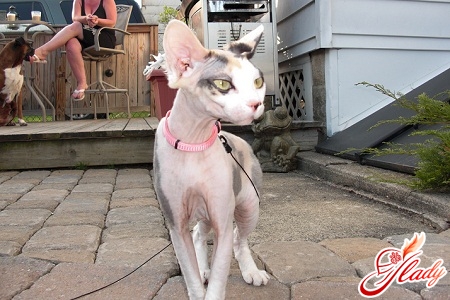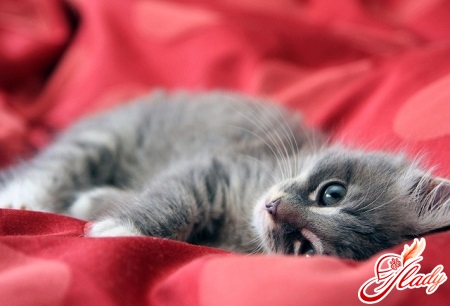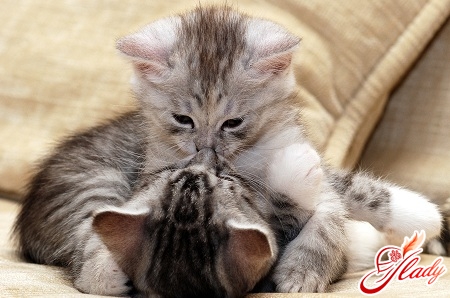 They say that if a cat lives in a house, then in thisthe house the doors are open to happiness. Indeed, these affectionate purring creatures are able to brighten up life, lift our spirits, relieve stress and even cure some of our ailments. However, the troubles from such a neighborhood are no less than pleasure. Especially if your domestic furry (and, perhaps, naked) doctor and psychotherapist is a female. Sooner or later, your pet will intend to reward you with a certain number of her own offspring. Well, and you, anticipating such a prospect, it would not hurt to find out at what age she is able to become a mother and how long she retains this ability, how a cat's pregnancy proceeds, what its period is, what surprises the owners should expect, how to care for a pregnant cat and whether this prospect can be prevented.
They say that if a cat lives in a house, then in thisthe house the doors are open to happiness. Indeed, these affectionate purring creatures are able to brighten up life, lift our spirits, relieve stress and even cure some of our ailments. However, the troubles from such a neighborhood are no less than pleasure. Especially if your domestic furry (and, perhaps, naked) doctor and psychotherapist is a female. Sooner or later, your pet will intend to reward you with a certain number of her own offspring. Well, and you, anticipating such a prospect, it would not hurt to find out at what age she is able to become a mother and how long she retains this ability, how a cat's pregnancy proceeds, what its period is, what surprises the owners should expect, how to care for a pregnant cat and whether this prospect can be prevented.
Reproductive age of a cat
Cats are precocious animals.Most domestic cats are able to become pregnant and give birth before the age of one. Most often, female cats reach sexual maturity at the age of six to eight months. But there are also individuals who can become pregnant at four months. However, veterinarians consider such a young age unfavorable for the first pregnancy: it is better if it occurs after a year. From the very first estrus, a healthy cat retains the ability to become pregnant and give birth almost until death. The concept of menopause does not apply to these animals. However, everything depends on the health and general condition of a particular individual. The most active and safe (and even useful) period for pregnancy in cats is from two to five years. And the frequency of births is no more than once a year, or at least every other estrus. The estrus itself (scientifically estrus) occurs without visible symptoms. That is, you will not see "traces" of this condition - bloody discharge. But the cat's behavior changes noticeably. She becomes overly restless and obsessively affectionate, fills the house with inviting cries and tries to escape from this house. The estrus period lasts on average a week. However, its duration is quite individual. The periodicity of this period also does not have a fixed frequency. Some cats estrus every month, and some only twice a year. The classic periodicity is once every three months, that is, every season. However, for nulliparous cats or those who have not yet mated, this periodicity is not relevant. In general, your cat is capable of becoming a mother already at six months (if her estrus begins at four months) and does not lose this ability until old age. That is, the duration of the cat's reproductive age is almost her entire sexually mature life. But this is only under the condition of good health and favorable living conditions.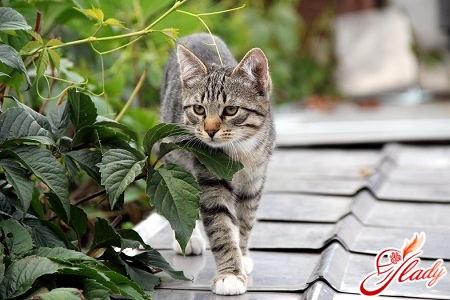
The course of pregnancy
The average gestation period for cats istwo months. Most animals experience this period relatively calmly. In the first month of pregnancy, no visible changes in the appearance and behavior of the cat are often observed. The animal behaves as usual, eats its usual food and does not give away its condition in any way. Therefore, at this stage, it can be very difficult to determine the pregnancy of a cat. And in the first three weeks, even an ultrasound examination will not give any results. Possible, but not obligatory changes are an increased appetite and a longer sleep time, as well as nausea in the morning. If the first half of pregnancy in cats is almost asymptomatic, then in the second half, clear signs of the interesting position of the cat appear. From this moment, the kittens begin to grow actively, and accordingly, the mother's belly will also grow. But at first, this growth is completely unnoticeable. But a change in the color and size of the nipples of a pregnant cat is noticeable: they swell and turn pink. Among veterinarians and cat owners, this is the sign that is considered clear evidence of a cat's pregnancy. The belly begins to noticeably increase only in the last trimester of pregnancy. At this time, you can already feel the fetuses and feel them moving. An ultrasound examination conducted in the second half of pregnancy will show the number of fetuses and determine possible pathologies. In a healthy cat, this period usually proceeds without complications, and the average duration of pregnancy in a cat ranges from fifty-eight days to sixty-eight, but sometimes even less or more by two or three days.
Possible pathologies
Even a perfectly healthy cat can become pregnantbe complicated by various pathologies. In addition, during this period, exacerbation of chronic diseases, various infections and hormonal disorders are possible. And even if your cat is in excellent health, it is not insured against such pathologies as:
- Primary or secondary ectopic pregnancy. Without treatment, the prognosis is extremely unfavorable, and everything can end with the death of the animal. However, cesarean section or artificial abortion will save the cat life.
- Abortion (spontaneous) in the people is called miscarriage. First, it is impossible to stop this process, and secondly, it does not pass without consequences. Therefore, without the participation of a specialist you can not do.
- A pregnant cat's pregnancy can provoke inflammation of the uterus and the death of the fetus. In the veterinary clinic, the delivery will be stimulated or the cesarean section will be done.
- Twisting of the uterus occurs when the cat falls or abruptly moves. So if your pet is excessively mobile during this period, be vigilant. This pathology is treated only by caesarean section.
Possible complications during pregnancy in cats:
- cystitis,
- renal failure,
- intestinal disorders (diarrhea or constipation),
- allergy,
- arrhythmia,
- obesity,
- dystrophy.
Therefore, be especially attentive to your pet during this period and be sure to show it to the veterinarian.
Care of a pregnant cat
What kind of care does your cat need during this period?As a rule, a cat does not need special care during pregnancy: pregnancy is not a disease, but a natural state. Therefore, do not try to limit the mobility of a pregnant cat and do not overfeed her. And this is exactly what inexperienced cat owners are guilty of. The fact is that a sedentary lifestyle can provoke obesity in an animal, even if not during pregnancy, then after childbirth. An excessively abundant diet also contributes to this. If a normal healthy cat can control her appetite in a normal state, then a pregnant cat often loses this control and can eat too much. It is necessary to tame excessive jumping only in the last stages of pregnancy. As for the diet of a pregnant cat, in the first month it should be the same both in volume and in composition. However, veterinarians advise increasing the amount of food rich in vitamins. If at this time the cat shows interest in fresh vegetables and fruits, then try giving her carrots, zucchini, apples, pumpkin. Although such changes in taste preferences in pregnant cats are rare. If your cat is used to ready-made food, then switch her to kitten food, which is also suitable for pregnant cats. It is not forbidden to give your cat vitamin supplements, but only after consulting a veterinarian. During the second half of pregnancy, increase the amount of food eaten by the cat by one and a half times. And during this period, she also needs protein-rich foods: cottage cheese, unsweetened sour milk, chicken eggs, beef. Only the food should not be fatty, and especially fried or spicy. And never feed your cat what you eat yourself: smoked and spicy food is contraindicated for cats (especially pregnant ones!). Proper care of a pregnant cat also implies systematic monitoring by a veterinarian. In most cases, such visits are preventive and advisory in nature. However, at the very beginning of pregnancy, the cat needs to be examined by a veterinarian. This will save her from possible complications, and you from unnecessary troubles and treatment costs. Shortly before the cat gives birth, it is also necessary to visit the doctor: she will undergo another examination by a specialist, and you will receive advice about the upcoming birth.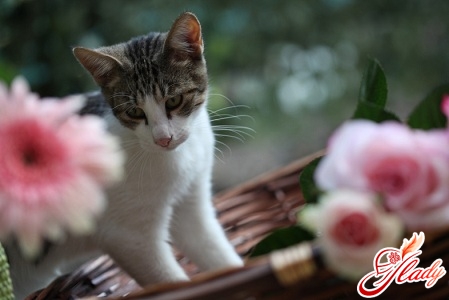
How to prevent pregnancy
No matter how beloved your cat is, if you don’twant to get offspring from her, it is necessary to take preventive measures. A cat will not refuse the opportunity to become a mother of her own free will. The most radical way to rid a cat of the prospect of pregnancy is sterilization. Today, this procedure is not very expensive, and it is carried out in almost all veterinary clinics. Sterilization of cats can be surgical, radiation and medical. The safest in terms of consequences is surgical. Surgical sterilization is carried out by several methods:
- Overstretch the fallopian tubes. In this case, the cat loses only the ability to conceive, but the estrus in her continues (as well as the call-ups).
- Remove the uterus, but keep the ovaries. The effect of such an operation, as in the first case.
- Remove the ovaries. The hormonal background of the animal completely changes, the cat stops estrus, and there is no risk of false pregnancy.
- Remove the uterus along with the ovaries. This method is already called castration.
The most animal-friendly methodsterilization - removal of the ovaries, but its use is possible only for young (up to a year) cats that have never given birth. If your cat is already over a year old, if she has brought kittens at least once, then you will have to castrate the animal. But the first two methods are almost never practiced by modern specialists, since they have not very good consequences for the physical and mental health of the cat. And which method to prefer should be decided by a veterinarian. There are usually no side effects from a properly performed operation. But sterilized and castrated cats are prone to obesity. In all other respects, the cat remains the same, maintaining playfulness, general activity and all instincts (except sexual). But you should determine the time for such an operation yourself: experts do not have a unified opinion on this matter. Today, sterilization is considered the most humane and most effective way to prevent pregnancy in cats. But if you are sorry to put your pet under the surgeon's knife, then you can stop at special injections - injections of hormonal drugs. However, such injections should not be given to sick animals and cats older than seven years. And one more (the most common) way to prevent cat pregnancy is oral contraceptives. But this method does not always work, and also has a negative effect on the physical health of the cat. Love your pets: they trust you infinitely. Take care of them and be lenient: after all, you are responsible for those you have tamed! We recommend reading:




